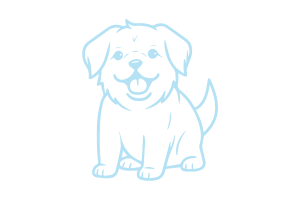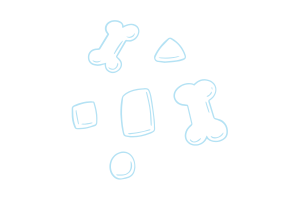
Become Our Member!
Join & Get Your Exclusive $5 OFF 🎁
Noora Best Sellers
Real dogs. Real results. Real love.
Why Choose Noora

We Will Never Compromise

Supporting Every Life Stage

We Know Every Pet's Unique Needs

Science Meets Nature Perfectly
Shop By Categories
Introduction
Spring should be full of sunshine and park walks. But for many pet parents, it also means nonstop scratching, red paws, and sleepless nights.
If your dog seems perfectly fine in winter but suddenly starts licking their paws or shaking their head when the weather warms up, seasonal allergies in dogs could be the reason.
Let’s break it down in a simple, real-life way.
 What Are Seasonal Allergies in Dogs?
What Are Seasonal Allergies in Dogs?
Seasonal allergies (also called environmental allergies or atopic dermatitis) happen when your dog’s immune system overreacts to things like:
-
Grass pollen
-
Tree pollen
-
Weeds
-
Mold spores
- Dust mites
✔Unlike food allergies, dog seasonal allergies usually flare up during specific months — often spring and fall.
Dog Seasonal Allergies Symptoms
Many pet parents first notice small behavior changes before realizing it’s allergies.
Common dog allergy symptoms include:
- Excessive paw licking or chewing
- Constant scratching
- Red, inflamed skin
- Hair thinning or bald spots
- Head shaking
- Recurring ear infections
- Watery eyes
✔Real-life clue: If your dog seems itchier after park visits or outdoor play, pollen allergies in dogs may be the trigger.
Why Do Dogs Get Itchy Skin in Spring?
When pollen levels rise, tiny particles stick to your dog’s fur and paws.
Unlike humans (who usually sneeze), dogs often show allergies through their skin.
That’s why itchy skin in dogs is one of the biggest seasonal allergy complaints.
Warm weather also increases humidity, which allows mold and dust mites to multiply indoors.
How Vets Diagnose Dog Seasonal Allergies
Veterinarians usually:
-
Review symptom timing (Does it happen every spring?)
-
Rule out fleas
-
Rule out food allergies
- Sometimes perform allergy testing
✔If symptoms are seasonal and repeat annually, it strongly suggests environmental allergies.
Dog Allergy Treatment Options

Treatment depends on severity.
1. Veterinary Treatments
Prescription anti-itch medications
- Cytopoint injections
- Apoquel tablets
- Steroids (short term use)
- Immunotherapy (allergy shots)
✔These can be highly effective but may require ongoing management.
2. At-Home Relief Tips (Daily Life Solutions)

For mild to moderate cases, daily habits make a big difference:
- Wipe paws after walks
- Bathe weekly with oatmeal shampoo
- Wash bedding frequently
- Use air purifiers indoors
- Add omega-3 supplements to support skin health
✔Many pet parents find that combining home remedies for dog allergies with vet-recommended treatment works best.
Seasonal Allergies vs Food Allergies in Dogs
| Seasonal Allergies | Food Allergies |
| Flare up certain months | Occur year-round |
| Often affect paws & ears | May cause digestive upset |
| Triggered by pollen, grass | Triggered by protein sources |
✔If itching happens all year long, food allergies might be worth exploring.
When Should You See a Vet?
Seek veterinary care if:
- Skin becomes infected
- Open sores develop
- Ear infections keep returning
- Your dog seems uncomfortable or in pain
✔Early treatment prevents chronic skin damage.
Can You Prevent Dog Seasonal Allergies?
While you can’t fully prevent environmental allergies, you can reduce flare-ups:
- Avoid peak pollen times
- Keep grass trimmed
- Clean paws daily
- Maintain skin barrier health year-round
- Consistency is key
Final Thoughts
Watching your dog scratch constantly is frustrating — especially when they can’t tell you what’s wrong.
The good news? Dog seasonal allergies are manageable.
Seasonal allergies in dogs cause itching, red skin, and ear infections. Learn real-life symptoms, causes, and dog allergy treatment options to help your pup feel better.
With the right combination of awareness, daily habits, and veterinary guidance, your pup can enjoy spring again.

Noora Allergy Support Health Supplement
This article is for educational purposes only and does not replace professional veterinary advice.
References
1. American College of Veterinary Dermatology. (n.d.). Atopic dermatitis in dogs. ACVD.
https://www.acvd.org/tools/educational-resources/atopic-dermatitis
2. American Kennel Club. (2023). Seasonal allergies in dogs: Symptoms and treatments. AKC.
https://www.akc.org/expert-advice/health/seasonal-allergies-in-dogs/
3. Merck Veterinary Manual. (2023). Allergic skin disorders in dogs. Merck & Co., Inc.
https://www.merckvetmanual.com/dog-owners/skin-disorders-of-dogs/allergic-skin-disorders-of-dogs
4. PetMD Editorial. (2024). Seasonal allergies in dogs. PetMD.
https://www.petmd.com/dog/conditions/skin/seasonal-allergies-dogs
5. Hillier, A., & Griffin, C. E. (2001). The ACVD task force on canine atopic dermatitis (I): Incidence and prevalence. Veterinary Immunology and Immunopathology, 81(3–4), 147–151.
https://doi.org/10.1016/S0165-2427(01)00296-8
What the New Lead Contamination Report Reveals?
Why You Should Worry About Heavy Metals in Protein Powders?
A recent Consumer Reports investigation revealed concerning findings about many popular protein powders and ready-to-drink shakes. Among 23 tested products, more than two-thirds contained lead levels exceeding their self-imposed “daily lead intake limit” (0.5 µg/day), based on California’s Prop 65 standard — which is stricter than FDA guidelines.
Plant-based protein powders (such as pea or rice protein) were found to contain up to nine times more lead than whey-based products.
This discovery doesn’t just affect people using protein powder for workouts — it also raises a red flag for pet owners who sometimes add human protein powder to their dog’s diet, or whose pets accidentally ingest it.

Can Dogs Eat Protein Powder?
What Exactly Is Protein Powder?
Protein powder is a processed supplement made from concentrated protein sources like whey, casein, egg, or plant-based proteins (soy, pea, rice, etc.). It’s designed for human nutritional needs, mainly for muscle recovery, fitness, or weight management.
However, human protein powder formulas often include additives like artificial sweeteners, flavoring agents, preservatives, and amino acid blends — all of which are not formulated for pets and can sometimes be unsafe.

Is It Safe for Dogs to Eat Human Protein Powder?
In short: no, it’s not recommended.
While a tiny accidental lick is unlikely to cause harm, regular or intentional feeding of human protein powder to pets can be risky.
Here’s why:
- Dosage mismatch — Human protein levels are much higher than what most pets need, and chronic over-supplementation can overwork a dog’s or cat’s kidneys.
- Toxic ingredients — Common protein powder additives like xylitol, stevia, caffeine, or chocolate flavoring can be toxic to pets.
- Contamination risks — The latest report revealed lead, cadmium, and arsenic contamination in several major protein powder brands, posing an additional danger for animals with smaller body weights and slower detox metabolism.
Why Heavy Metal Contamination Poses a Bigger Risk to Pets?
Consumer Reports’ testing found that some protein powders contained up to 6.3–7.7 µg of lead per serving, far above the 0.5 µg/day threshold they recommend.
Lead is a well-known neurotoxin, associated with learning deficits, hyperactivity, and neurological damage in children — and pets are even more sensitive.
Even small, chronic exposures can lead to:
- Neurological problems (lethargy, tremors, confusion)
- Gastrointestinal distress
- Kidney and liver strain
- Developmental issues in young pets
Experts stress that “no amount of lead exposure is completely safe”, and that applies equally to pets.
What to Do If Your Pet Eats Human Protein Powder?
1. Observe closely. If your dog or cat only consumed a small amount (a lick or two), monitor for vomiting, diarrhea, or lethargy.
2. Do not continue feeding the product. Move protein powders out of your pet’s reach.
3. Contact your vet if your pet is very young, senior, or has pre-existing kidney/liver issues, or if they consumed a large quantity.
- The vet may suggest lab tests or even heavy metal screening, though it’s less common in veterinary practice than in human medicine.
4. Never use human protein powder as a regular supplement. Only use products specifically formulated for animals.
Safe Ways to Support Your Pet’s Protein Intake
- Balanced diet first: Most healthy adult dogs and cats already get adequate protein from quality pet food.
- Vet-approved supplements only: If extra protein is needed (e.g., post-surgery, muscle loss, recovery), use veterinary-formulated protein supplements with transparent ingredient lists and third-party lab testing.
-
Avoid plant-based human protein powders — they tend to have higher heavy-metal contamination.
-
Proper storage: Keep human supplements and protein powders out of pets’ reach to prevent accidental ingestion.
References
1.American Veterinary Medical Association. (2017, October 15). Finding lead in pets. JAVMA News. Retrieved from https://www.avma.org/javma-news/2017-10-15/finding-lead-pets
2.Clean Label Project. (2024). 2024-25 Protein Powder Category Report. Retrieved from https://cleanlabelproject.org/wp-content/uploads/CleanLabelProject_ProteinStudyWhitepaper_010625.pdf
3.Maddison, J. E., & Allan, G. S. (1990). Lead toxicosis in cats — A review. Australian Veterinary Journal, (One of the series reviewed in “Lead toxicosis in cats—a review”). Retrieved from https://pmc.ncbi.nlm.nih.gov/articles/PMC10822269/
4.Moses, E., & Ehireme, I. A. (2025). Animal exposure to lead, mechanism of toxicity and treatment strategy — a review. Clinical Case Reports and Studies, 9(1), 1-9. https://doi.org/10.59657/2837-2565.brs.25.212
5.Parasuraman, S., Raveendran, R., & Rahman, S. (2016). A human health risk assessment of heavy metal ingestion among protein powder supplement users. Food and Chemical Toxicology, (…) Retrieved from https://pmc.ncbi.nlm.nih.gov/articles/PMC7509468/
6.Sanders, T., Liu, Y., Buchner, V., & Tchounwou, P. B. (2009). Neurotoxic effects and biomarkers of lead exposure: A review. Reviews on Environmental Health, 24(1), 15-45. Retrieved from https://doi.org/10.1515/REVEH.2008.24.1.15
7.Schmitt, J., Jaeger, D., Förster, I., & Becker, J. (2016). Risk assessment of feeding dogs trimmings of lead-shot game. BMC Veterinary Research, 12, 132. Retrieved from https://doi.org/10.1186/s12917-016-0771-z
8.Taylor, M. (2016). The detrimental effects of lead on human and animal health. Veterinary World, 9(6), 660-665. Retrieved from https://www.veterinaryworld.org/Vol.9/June-2016/20.html
9.Thompson, J., & … (2023). A review of important heavy metals toxicity with special emphasis on animals. Frontiers in Veterinary Science, 10, 1149720. Retrieved from https://doi.org/10.3389/fvets.2023.1149720
10.“Lead poisoning in animals — Toxicology” (n.d.). The Merck Veterinary Manual. Retrieved from https://www.merckvetmanual.com/toxicology/lead-poisoning/lead-poisoning-in-animals
Introduction
Hurricane Irene, which has been closely monitored by everyone, is currently moving across the Atlantic Ocean. It is the first hurricane of the season 2025 and has intensified from a Category 1 to a Category 5 hurricane within just 24 hours. Its powerful force has caused 130,000 households in Puerto Rico to lose power. The storm's eye is now approaching the U.S. East Coast. Authorities predict that the hurricane will not make landfall on the U.S. mainland, but the strong winds will impact the Outer Banks of North Carolina. Authorities have declared a state of emergency and ordered all residents and tourists to evacuate immediately.

So, as a pet owner, how to keep dogs safe during Hurricane Irene?
Dogs depend on us for safety and comfort, and hurricanes can be frightening experiences for them. Loud winds, thunder, heavy rain, and the stress of evacuation can trigger fear, anxiety, and even health risks. Here’s a comprehensive guide on Hurricane safety for dogs, including building a safe environment, preparing a pet emergency kit for hurricanes, and calming your furry friends during the storm.
1.Create a Safe shelter
- Choose a quiet, enclosed area inside your home for your dog away from windows—such as a corner of a bedroom or the bottom of a wardrobe.
- Provide a comfortable dog carrier or crate with blankets, familiar toys, and enough space for your dog to move.
- Keep doors and windows closed to block out strong winds and thunder sounds.
Minimize internal household noise, such as TV volume.
2. Stay Calm and Provide Companionship
- Pet owners should remain calm and avoid showing anxiety or tension, as this helps to reassure the dog.
- Spend as much time as possible with the dog, gently petting its body and comforting it with a soft tone of voice.
- Playing soft music or turning on the TV can help distract the dog and reduce its fear.
- Consider using calming aids such as the Noora Calming Health Supplement, which contains natural ingredients to help soothe stress in dogs.
3. Adjust Diet and Monitor Health During the Storm
- Dogs may refuse food when stressed. Offer smaller, palatable meals or special treats to encourage eating. Nutritious options like Noora Superfood Treats can provide both comfort and essential nutrients.
- Keep fresh water available at all times.
- Monitor your dog’s health closely—watch for vomiting, diarrhea, or changes in behavior. If symptoms persist, seek veterinary care as soon as conditions allow.
4. Prepare a Pet Emergency Kit for Hurricanes
Just like families need a survival kit, dogs need one too. A well-prepared pet emergency kit for hurricanes should include:
- Food & treats: At least 3–5 days’ worth of food and bottled water.
- Medications: Any daily prescriptions, flea/tick prevention, and first-aid supplies.
- ID & documents: Vaccination records, microchip information, and a recent photo of your dog.
- Comfort items: Favorite toys, blankets, or chews to help reduce stress.
-
Portable dog carrier & leash: Essential for quick evacuation.
- Sanitation supplies: Waste bags and cleaning wipes.
5. Understand emergency evacuation information
- Identify pet-friendly shelters or hotels in advance. Many emergency shelters may not accept pets unless designated as such.
- Keep a list of veterinarians and emergency animal hospitals in your area.
- Build a neighborhood support network to help each other with pets during evacuations.
6. How to Calm Dogs During a Hurricane Storm
Storms can cause panic in even the calmest dogs. To help reduce anxiety:
-
Maintain routines when possible—feeding, walking, and resting at familiar times.
- Use gentle play or puzzle feeders to distract from the noise.
- If your dog struggles with severe storm anxiety, ask your vet about safe calming aids or supplements.
Final Thoughts
Hurricanes like Hurricane Irene 2025 remind us how vital preparation is—not just for ourselves but also for our pets. By creating a safe environment, preparing a pet emergency kit for hurricanes, and knowing how to calm dogs during a hurricane storm, you can significantly reduce risks and ensure your furry family members stay safe.
Remember, dog safety during Hurricane Irene is not just about survival—it’s about keeping your companion comfortable, healthy, and reassured through one of nature’s most stressful events.
References
1.American Veterinary Medical Association. (2020). Disaster preparedness for pets. AVMA. Retrieved from https://www.avma.org/resources/pet-owners/emergencycare/disaster-preparedness-pets
2.Centers for Disease Control and Prevention. (2022). Keep your pets safe in a disaster. CDC. Retrieved from https://www.cdc.gov/healthypets/emergencies/index.html
3.Federal Emergency Management Agency. (2023). Prepare for disasters: Pet owners. Ready.gov. Retrieved from https://www.ready.gov/pets
4.Humane Society of the United States. (2023). Disaster preparedness for pets. HSUS. Retrieved from https://www.humanesociety.org/resources/disaster-preparedness-pets
5.PetMD Editorial. (2023, August 23). 10 hurricane safety tips for pet parents. PetMD. Retrieved from https://www.petmd.com/general-health/hurricane-safety-tips-for-pets
Introduction
From “rabbits with tentacles” making waves on Google Trends to social media posts of “horned rabbits,” “Frankenstein bunnies,” “demon rabbits,” and “zombie rabbits,” strange-looking lagomorphs are dominating online conversations. While they appear bizarre and almost fictional, these images often have real biological explanations. Many are linked to Shope papilloma virus, also known as rabbit papillomavirus, which can cause horn-like or unusual growths on rabbits—likely inspiring the legendary jackalope.

For dog owners, these odd rabbit conditions may spark a related worry: what about warts in dogs? Medically called canine papillomas, dog warts are caused by the canine papilloma virus. Pet parents often ask: “Can dogs get warts?” “Can dog warts turn into cancer?” and “Can warts from dogs spread to other pets?”

Before you search for home remedies or worry about warts from dogs, it’s important to speak with a veterinarian for guidance. In this article, our experts explain the link between papillomavirus in dogs, how canine papilloma spreads, and what steps you can take to keep your dog healthy.
Dog Warts (Canine Papillomas) Complete Guide: Causes, Signs, Diagnosis, Treatment, Recovery & Prevention
Dog warts, also known as canine papillomas, are a common skin issue in dogs that can worry pet parents. These growths are caused by the canine papilloma virus and often appear as small, cauliflower-like bumps on the mouth, lips, eyelids, or paws. While most cases are harmless, many owners ask: “Can dogs get warts?” and even more importantly, “Can dog warts turn into cancer?”
This comprehensive guide covers everything you need to know about dog warts—from causes and signs to diagnosis, treatment, recovery, and prevention.
Causes of Dog Warts (Canine Papillomas)
Dog warts are caused by the canine papilloma virus (CPV), which spreads between dogs through direct contact or contaminated objects like toys, bowls, or bedding.
Dogs of all ages can develop warts, but puppies and senior dogs are at higher risk due to weaker immune systems. Risk factors include:
- Direct contact with infected dogs
- Sharing contaminated items (toys, bowls, bedding)
- Weak immune system (in young, elderly, or sick dogs)
- Stress or illness that lowers immune defenses
- High exposure in places like kennels, dog parks, or shelters
Signs of Dog Warts
Recognizing the symptoms early can help ensure timely care. Common signs of dog warts include:
- Small, raised, or cauliflower-shaped bumps on lips, gums, eyelids, or paws
- Clusters of warts around the mouth or face
- Pain or bleeding if the dog scratches or chews the wart
- Difficulty eating or chewing when warts grow inside the mouth
- Irritation or limping if warts appear between paw pads
- Secondary infections from licking or scratching
While most warts remain benign, sudden changes in size, shape, or color should be evaluated by a vet.
How Veterinarians Diagnose Dog Warts
If you notice unusual growths, your vet will begin with a physical exam and medical history. Since warts from dogs can resemble other skin issues, further tests may be needed, including:
- Visual inspection of the bumps for the classic papilloma appearance
- Biopsy or fine-needle aspiration to confirm if the growth is a benign wart
- Histopathology (microscopic exam) to rule out tumors or abnormal cells
- Blood work to check your dog’s immune health
Many pet parents worry, “Can dog warts turn into cancer?” While rare, vets may recommend a biopsy for persistent or unusual growths to rule out malignant changes.
Treatment for Dog Warts
How to treat dog warts? In most cases, treatment is not required—canine papillomas often resolve naturally within 1–3 months. However, if warts cause discomfort, spread rapidly, or interfere with eating, walking, or vision, treatment may be necessary.
Veterinary treatment options include:
- Surgical removal of large or bothersome warts
- Cryotherapy (freezing) to eliminate growths
- Laser therapy for persistent papillomas
- Antiviral or immune-boosting medications in select cases
At-home care includes preventing your dog from licking or scratching warts and maintaining good hygiene of toys and bedding. Always consult your vet before attempting any home remedies.
Recovery and Management of Dog Warts
Recovery time depends on your dog’s immune system. Most dog warts disappear without complications, but puppies and older dogs may need longer. During recovery:
- Stop your dog from chewing or scratching warts
- Clean and disinfect shared items to reduce spread
- Limit close contact with other dogs (since warts from dogs are contagious)
- Provide a balanced diet and regular exercise to strengthen immunity
Although canine papillomas are usually benign, any persistent or abnormal growth should be checked to rule out rare cancerous transformation.
Prevention of Dog Warts
While you cannot completely prevent canine papillomas, you can lower your dog’s risk:
- Avoid sharing toys, bowls, or bedding with unfamiliar dogs
- Practice good hygiene by regularly cleaning your dog’s belongings
- Limit exposure in high-risk environments like kennels or shelters
- Support your dog’s immune system with proper nutrition, rest, and routine veterinary checkups
A common concern is, “Are dog warts contagious?” Yes, they can spread between dogs, but they are not contagious to humans or cats.
Final Thoughts
Dog warts are a common and usually harmless condition caused by the canine papilloma virus. Most will resolve on their own, but monitoring is important. If you notice sudden changes in a wart’s size, shape, or color, consult your veterinarian immediately.
By understanding the causes, signs, diagnosis, treatment, recovery, and prevention of dog warts, you can keep your pet healthy and minimize the risks associated with canine papillomas.

Noora Daily Multi with 21 Beneficial Nutrients
Dog Warts FAQs
Can dogs get warts?
Yes. Dog warts, also called canine papillomas, are caused by the canine papilloma virus. They usually appear as small, cauliflower-like growths on the mouth, lips, eyelids, or paws.
Are dog warts contagious?
Yes. Warts from dogs can spread to other dogs through direct contact or shared items like toys, bowls, and bedding. However, they cannot spread to humans or other pets such as cats.
How long do dog warts last?
In most healthy dogs, warts resolve on their own within 1–3 months as the immune system fights off the virus. Puppies and senior dogs, who have weaker immune systems, may take longer to recover.
How can I treat my dog’s warts?
Many warts don’t need treatment and will disappear naturally. If the warts cause pain, interfere with eating or walking, or become infected, a veterinarian may recommend removal through surgery, cryotherapy (freezing), or laser treatment. Always consult your vet before attempting treatment at home.
Can dog warts turn into cancer?
In the majority of cases, canine papillomas remain benign and harmless. Rarely, persistent or abnormal warts may transform into malignant tumors. For this reason, any wart that changes in size, color, or shape should be examined by a veterinarian.
References
1.VCA Animal Hospitals. (n.d.). Papilloma of the skin in dogs. Retrieved from https://vcahospitals.com/know-your-pet/papilloma-of-the-skin
2.West Coast Veterinary Dental Services. (n.d.). Oral papillomas in dogs. Retrieved from https://www.vet.bc.ca/oral-papillomas.pml
3.Pawlicy Advisor. (2023). Oral papilloma virus in dogs: Symptoms, treatment & prevention. Retrieved from https://www.pawlicy.com/blog/oral-papilloma-virus-in-dogs
4.Lange, C. E., Tobler, K., & Ackermann, M. (2011). The variability of canine papillomaviruses. The Veterinary Clinics of North America: Small Animal Practice, 41(6), 1041–1058. doi:10.1016/j.cvsm.2011.08.005
5.Tislerics, A., & Callan, M. B. (2017). Canine papillomavirus infections. Clinical Veterinary Advisor. Retrieved from https://www.sciencedirect.com/science/article/abs/pii/S1090023317300965
6.Mao, C., et al. (2025). Genomic and epidemiological insights into canine papillomavirus. Virology Journal, 22(15), 1–12. doi:10.1186/s12985-025-02753-3
7.Frontiers in Veterinary Science. (2023). Canine papillomavirus: Natural course and malignant potential. Frontiers in Veterinary Science, 10, 1174673. doi:10.3389/fvets.2023.1174673
8.Pet Cancer Foundation. (2023). What treatments are available for canine papillomavirus? Retrieved from https://petcancerfdn.org/pet-health/canine-viruses-and-infections/what-treatments-are-available-for-cpv




































